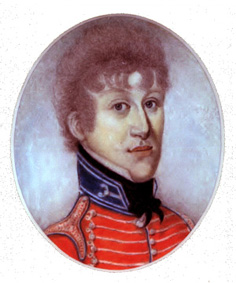Captain Joseph Moss Balchin was at various times a Lieutenant in the 6th Inniskilling Dragoons and a Captain in the Surrey Fencibles or Light Dragoons.
On 1st May 1794 he, then aged 17 or 18, was commissioned as a Lieutenant in the Surrey regiment which was formed to repel invasion during the time of the Napoleonic Wars. He served under Captain James More Molyneux (curiously his ancestor William Balchild had sold land to James’s forbears in the late 14th century) who was appointed by the government’s representative Lord Onslow to captain the force.
On Christmas Day 1795 the regiment marched (and the officers rode) to West Country where they settled at Barnstaple Barracks. There are contemporary references to the young Balchin: who ‘was to be congratulated on overcoming the matter of dishonesty by suppliers of horse feed’ . He paid 3/9d for a sword knot, 5/-d for a helmet and its box, £8-3s-6d for his horse trappings, £1-14s for a sabre belt and plate, £1-7s for a sash and £4-12s-9d for a cloak. He conducted himself ‘with tolerable propriety’ (!)
On 27th October 1802 the Surrey Fencibles were disbanded and the officers and men given the option of transferring to permanent regiments in the British Army. Joseph, by this time a Captain, transferred to the 6th Inniskilling Dragoons.
By 1804, however, Joseph Moss Balchin had married and had a daughter Harriotte St John Balchin, (baptised at Plymouth on 15th May 1803) and he decided to leave the army after ten years’ service. He sold his commission (the custom in those times) for around £1000.
